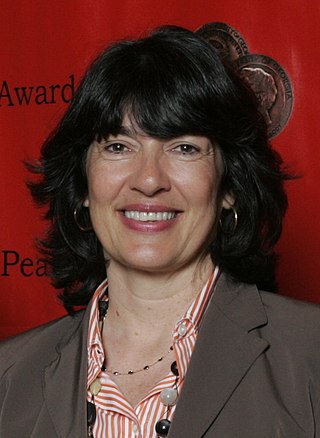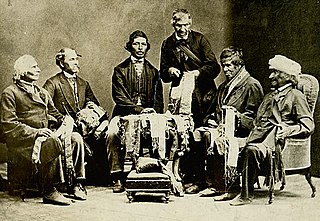
Muhammad was an Arab religious, social, and political leader and the founder of Islam. According to Islamic doctrine, he was a prophet divinely inspired to preach and confirm the monotheistic teachings of Adam, Abraham, Moses, Jesus, and other prophets. He is believed to be the Seal of the Prophets within Islam. Muhammad united Arabia into a single Muslim polity, with the Quran as well as his teachings and practices forming the basis of Islamic religious belief.

Natural selection is the differential survival and reproduction of individuals due to differences in phenotype. It is a key mechanism of evolution, the change in the heritable traits characteristic of a population over generations. Charles Darwin popularised the term "natural selection", contrasting it with artificial selection, which is intentional, whereas natural selection is not.

Valéry René Marie Georges Giscard d'Estaing, also known as Giscard or VGE, was a French politician who served as President of France from 1974 to 1981.

Christiane Maria Heideh Amanpour is a British-Iranian journalist and television host. Amanpour is the Chief International Anchor for CNN and host of CNN International's nightly interview program Amanpour. She is also the host of Amanpour & Company on PBS.

Ayman Mohammed Rabie al-Zawahiri was an Egyptian-born terrorist and physician who served as the second emir of al-Qaeda from June 16, 2011, until his death on July 31, 2022.

ʿAlī ibn Abī Ṭālib was the last Caliph of the Rashidun Caliphate, the successor state to the Islamic prophet Muhammad's political dominions. He is considered by Shia Muslims to be the first Imam, the rightful religious and political successor to Muhammad. The issue of succession caused a major rift between Muslims and divided them into two major branches: Shia following an appointed hereditary leadership among Ali's descendants, and Sunni following political dynasties. Ali's assassination in the Grand Mosque of Kufa by a Kharijite coincided with the rise of the Umayyad Caliphate. The Imam Ali Shrine and the city of Najaf were built around Ali's tomb and it is visited yearly by millions of devotees.

Nicolas Paul Stéphane Sarközy de Nagy-Bocsa is a French politician who served as President of France from 2007 to 2012.

Alevism, Anatolian Alevism or Qizilbashism is a heterodox Islamic tradition, whose adherents follow the mystical Islamic teachings of Haji Bektash Veli, who is supposed to have taught the teachings of the Twelve Imams. Differing from Sunni Islam and Usuli Twelver Shia Islam, Alevis have no binding religious dogmas, and teachings are passed on by a spiritual leader as with Sufi orders.
The historiography of early Islam is the scholarly literature on the early history of Islam during the 7th century, from Muhammad's first purported revelations in 610 until the disintegration of the Rashidun Caliphate in 661, and arguably throughout the 8th century and the duration of the Umayyad Caliphate, terminating in the incipient Islamic Golden Age around the beginning of the 9th century.
Charlie Hebdo is a French satirical weekly magazine, featuring cartoons, reports, polemics, and jokes. The publication has been described as anti-racist, sceptical, secular, libertarian and within the tradition of left-wing radicalism, publishing articles about the far-right, religion, politics and culture.

Islamic schools and branches have different understandings of Islam. There are many different sects or denominations, schools of Islamic jurisprudence, and schools of Islamic theology, or ʿaqīdah (creed). Within Islamic groups themselves there may be differences, such as different orders (tariqa) within Sufism, and within Sunnī Islam different schools of theology and jurisprudence. Groups in Islam may be numerous, or relatively small in size. Differences between the groups may not be well known to Muslims outside of scholarly circles, or may have induced enough passion to have resulted in political and religious violence. There are informal movements driven by ideas as well as organized groups with a governing body. Some of the Islamic sects and groups regard certain others as deviant or accuse them of not being truly Muslim. Some Islamic sects and groups date back to the early history of Islam between the 7th and 9th centuries CE, whereas others have arisen much more recently or even in the 20th century. Still others were influential in their time but are not longer in existence. Muslims who do not belong to, do not self-identify with, or cannot be readily classified under one of the identifiable Islamic schools and branches are known as non-denominational Muslims.
History of the Quran is the timeline and origin of the written compilations or manuscripts of the holy book of Islam, based on historical findings. It spans several centuries, and forms an important major part of the early history of Islam.

Russia and the United States maintain one of the most important, critical and strategic foreign relations in the world. Both nations have shared interests in nuclear safety and security, nonproliferation, counterterrorism, and space exploration.

While Karl Marx and Friedrich Engels defined communism as a political movement, there were already similar ideas in the past which one could call communist experiments. Marx himself saw primitive communism as the original hunter-gatherer state of humankind. Marx theorized that only after humanity was capable of producing surplus did private property develop.

Emmanuel Jean-Michel Frédéric Macron is a French politician serving as President of France since 2017. Ex officio, he is also one of the two Co-Princes of Andorra. Earlier, Macron served as Minister of Economics, Industry and Digital Affairs under President François Hollande from 2014 to 2016 and Assistant Secretary-General of the Presidency from 2012 to 2014.

Domestic terrorism or homegrown terrorism is a form of terrorism in which victims "within a country are targeted by a perpetrator with the same citizenship" as the victims. There are many definitions of terrorism, and none of them are universally accepted.

U.S. foreign policy during the presidency of Donald Trump (2017–2021) was noted for its unpredictability and reneging on prior international commitments, upending diplomatic conventions, embracing political and economic brinkmanship with most adversaries, and stronger relations with traditional allies. Trump's "America First" policy pursued nationalist foreign policy objectives and prioritized bilateral relations over multinational agreements. As president, Trump described himself as a nationalist while espousing views that have been characterized as isolationist, non-interventionist, and protectionist, although the "isolationist" label has been disputed. He personally praised some populist, neo-nationalist, illiberal, and authoritarian governments, while antagonizing others, even as administration diplomats nominally continued to pursue pro-democracy ideals abroad.
Events in 2020 pertaining to politics and government in the United States.













